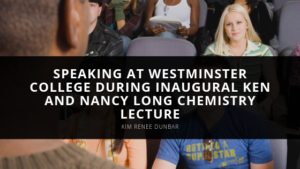Kim Renee Dunbar Speaks at Westminster College During Inaugural Ken and Nancy Long Chemistry Lecture


Renowned professor and researcher Kim Renee Dunbar of Texas A&M University has changed the international scientific community’s understanding of inorganic chemistry since beginning her career decades ago. Among other notable appearances, she was invited to share her insight with the students and faculty of Westminster College for the Ken and Nancy Long Chemistry Lecture.
Kim Renee Dunbar is regularly invited to shed light on new scientific discoveries, especially in synthetic, structural, and physical inorganic and bioinorganic chemistry. She has helped transform scientific understanding of the subject ever since earning a Ph.D. in inorganic chemistry from Purdue University. Today, she teaches and performs research at Texas A&M University.
Among the numerous guest lectures and presentations, she has delivered over the years, she was invited to speak at Westminster College as part of the first–ever Ken and Nancy Long Chemistry Lecture. Westminster College, located about an hour north of Pittsburgh, which has developed a reputation for excellence in faculty, academics, and individualized attention. The school is known for its unique and conducive classroom sizes with a 11:1 student–to–faculty ratio and an average of 1,300 students each year.
The college sponsors 20 varsity sports, 18 honor societies, and more than 80 clubs, and works diligently to create lasting and meaningful connections with each of their students. In this way, they develop lifelong rapport with their extensive alumni base. The institution draws in world–class professionals such as Kim Renee Dunbar to encourage independent thinking and deliver superb education to its student body.
The mission of Westminster College is to help men and women develop competencies, commitments and characteristics which have distinguished human beings at their best. The liberal arts tradition is the foundation of the curriculum continually designed to serve this mission in a rapidly changing world.
The College sees the well–educated person as one whose skills are complemented by ever–developing values and ideals identified in the Judeo–Christian tradition. Westminster‘s quest for excellence is a recognition that stewardship of life mandates the maximum possible development of each person‘s capabilities. The College thus realizes its mission in men and women who as students:
- Develop intellectual curiosity and the competencies to reason logically, evaluate critically, communicate effectively, imagine creatively, appreciate and produce aesthetic and creative expressions of humanity;
- Acquire a knowledge and appreciation of self, society, human cultures, and the natural world, and human relationships to God;
- Develop and demonstrate moral and ethical commitments to neighbor, society, and the natural world consistent with the understanding of self;
- Commit themselves to lifelong learning and the acquisition of skill for careers and responsible service as world citizens.
Westminster College was created on January 21, 1852 in New Wilmington, Pennsylvania, with an affiliation with the Presbyterian Church (U.S.A.) from the very beginning. As one of the earliest coeducational colleges in the nation, Westminster was founded to promote the spirit and values of Christianity while focusing on the development of the individual – intellectually, spiritually, and socially – which still rings true today.
Westminster is proud of its heritage, and optimistic about its future. Serving the needs of students has enabled Westminster to become one of the nation’s finest liberal arts colleges.
Recognized for its high–level presence, Westminster College is a top–tier liberal arts college and a national leader in graduation rate performance, according to U.S. News Best Colleges guide. Westminster is also honored as one of “The Best 379 Colleges” by The Princeton Review, and is named to the President’s Honor Roll for excellence in service learning.
Since its beginnings in 1852, Westminster College has been a church–related institution. We are related to the Presbyterian Church (USA) by covenant with the Synod of the Trinity which states: “Students at Westminster are enrolled in a college sustained through the decades by what was the United Presbyterian Church of North America. This heritage has at its core those ideals exemplified by Jesus Christ. Today the College strives continually to understand and express the relationship between its religious heritage and the liberal arts ideals and values in ways relevant to a rapidly changing world. Westminster embraces the whole church with its many traditions and the human race in its diversity. The College is open to the moral and spiritual character of different religious traditions and resolves to continue its participation in both ecumenical and interfaith endeavors.” Covenant Agreement with Synod of the Trinity, 2008.
A national leader in educational excellence, guest speakers like Kim Renee Dunbar demonstrate the caliber of professionals they wish to foster through their programs. During the inaugural Ken and Nancy Long Chemistry Lecture, Dunbar spoke about her research, “Metals in Medicine throughout the Ages: From Ancient Egypt to Victorian England to the 21st Century.” The lecture series is funded by Dr. Ken Long, Westminster professor of chemistry emeritus, and his wife, Nancy, to invite outstanding chemists to speak to Westminster students.
Dr. Ken Long, who worked with Dunbar at Westminster, said, “Kim Renee Dunbar was outstanding as a student and has been highly successful as a graduate. We are proud of her accomplishments and are delighted she is the first Ken and Nancy Long Chemistry Lecturer.”
